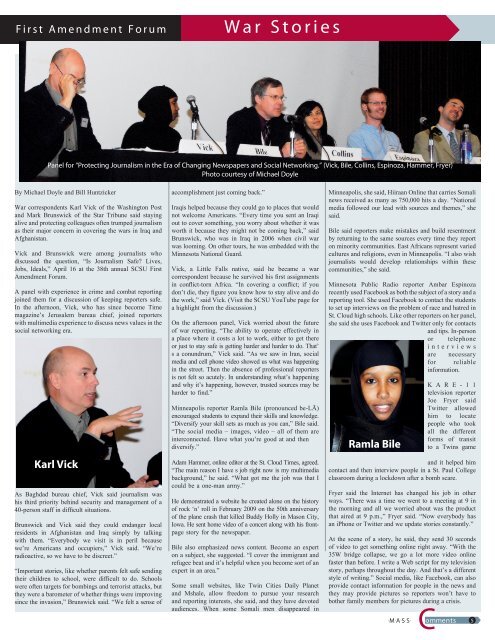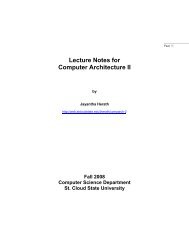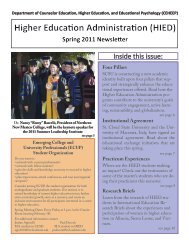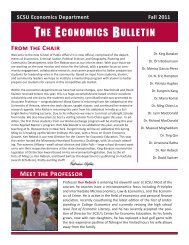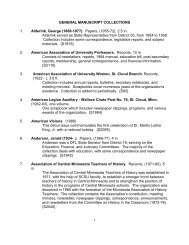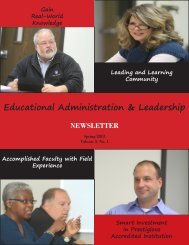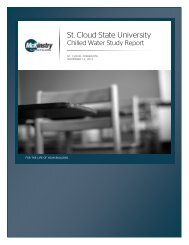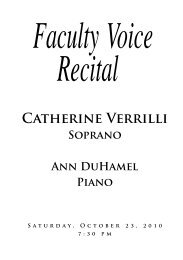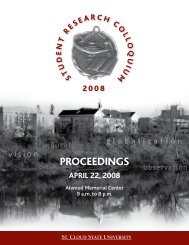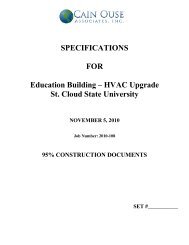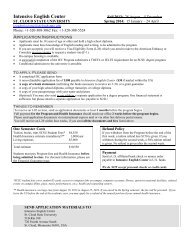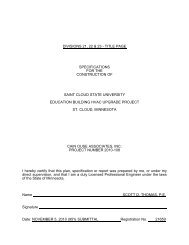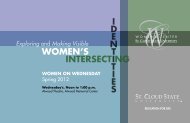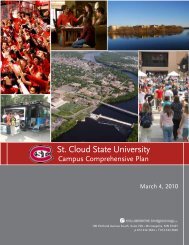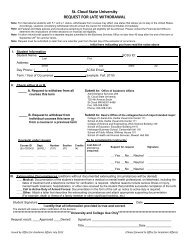Fall 2010 - St. Cloud State University
Fall 2010 - St. Cloud State University
Fall 2010 - St. Cloud State University
You also want an ePaper? Increase the reach of your titles
YUMPU automatically turns print PDFs into web optimized ePapers that Google loves.
a<br />
First Amendment Forum<br />
War <strong>St</strong>ories<br />
Panel for “Protecting Journalism in the Era of Changing Newspapers and Social Networking.” (Vick, Bile, Collins, Espinoza, Hammer, Fryer)<br />
Photo courtesy of Michael Doyle<br />
By Michael Doyle and Bill Huntzicker<br />
War correspondents Karl Vick of the Washington Post<br />
and Mark Brunswick of the <strong>St</strong>ar Tribune said staying<br />
alive and protecting colleagues often trumped journalism<br />
as their major concern in covering the wars in Iraq and<br />
Afghanistan.<br />
Vick and Brunswick were among journalists who<br />
discussed the question, “Is Journalism Safe? Lives,<br />
Jobs, Ideals,” April 16 at the 38th annual SCSU First<br />
Amendment Forum.<br />
A panel with experience in crime and combat reporting<br />
joined them for a discussion of keeping reporters safe.<br />
In the afternoon, Vick, who has since become Time<br />
magazine’s Jerusalem bureau chief, joined reporters<br />
with multimedia experience to discuss news values in the<br />
social networking era.<br />
Karl Vick<br />
As Baghdad bureau chief, Vick said journalism was<br />
his third priority behind security and management of a<br />
40-person staff in difficult situations.<br />
Brunswick and Vick said they could endanger local<br />
residents in Afghanistan and Iraq simply by talking<br />
with them. “Everybody we visit is in peril because<br />
we’re Americans and occupiers,” Vick said. “We’re<br />
radioactive, so we have to be discreet.”<br />
“Important stories, like whether parents felt safe sending<br />
their children to school, were difficult to do. Schools<br />
were often targets for bombings and terrorist attacks, but<br />
they were a barometer of whether things were improving<br />
since the invasion,” Brunswick said. “We felt a sense of<br />
accomplishment just coming back.”<br />
Iraqis helped because they could go to places that would<br />
not welcome Americans. “Every time you sent an Iraqi<br />
out to cover something, you worry about whether it was<br />
worth it because they might not be coming back,” said<br />
Brunswick, who was in Iraq in 2006 when civil war<br />
was looming. On other tours, he was embedded with the<br />
Minnesota National Guard.<br />
Vick, a Little <strong>Fall</strong>s native, said he became a war<br />
correspondent because he survived his first assignments<br />
in conflict-torn Africa. “In covering a conflict; if you<br />
don’t die, they figure you know how to stay alive and do<br />
the work,” said Vick. (Visit the SCSU YouTube page for<br />
a highlight from the discussion.)<br />
On the afternoon panel, Vick worried about the future<br />
of war reporting. “The ability to operate effectively in<br />
a place where it costs a lot to work, either to get there<br />
or just to stay safe is getting harder and harder to do. That’<br />
s a conundrum,” Vick said. “As we saw in Iran, social<br />
media and cell phone video showed us what was happening<br />
in the street. Then the absence of professional reporters<br />
is not felt so acutely. In understanding what’s happening<br />
and why it’s happening, however, trusted sources may be<br />
harder to find.”<br />
Minneapolis reporter Ramla Bile (pronounced be-LĀ)<br />
encouraged students to expand their skills and knowledge.<br />
“Diversify your skill sets as much as you can,” Bile said.<br />
“The social media – images, video – all of them are<br />
interconnected. Have what you’re good at and then<br />
diversify.”<br />
Adam Hammer, online editor at the <strong>St</strong>. <strong>Cloud</strong> Times, agreed.<br />
“The main reason I have s job right now is my multimedia<br />
background,” he said. “What got me the job was that I<br />
could be a one-man army.”<br />
He demonstrated a website he created alone on the history<br />
of rock ‘n’ roll in February 2009 on the 50th anniversary<br />
of the plane crash that killed Buddy Holly in Mason City,<br />
Iowa. He sent home video of a concert along with his frontpage<br />
story for the newspaper.<br />
Bile also emphasized news content. Become an expert<br />
on a subject, she suggested. “I cover the immigrant and<br />
refugee beat and it’s helpful when you become sort of an<br />
expert in an area.”<br />
Some small websites, like Twin Cities Daily Planet<br />
and Mshale, allow freedom to pursue your research<br />
and reporting interests, she said, and they have devoted<br />
audiences. When some Somali men disappeared in<br />
Minneapolis, she said, Hiiraan Online that carries Somali<br />
news received as many as 750,000 hits a day. “National<br />
media followed our lead with sources and themes,” she<br />
said.<br />
Bile said reporters make mistakes and build resentment<br />
by returning to the same sources every time they report<br />
on minority communities. East Africans represent varied<br />
cultures and religions, even in Minneapolis. “I also wish<br />
journalists would develop relationships within these<br />
communities,” she said.<br />
Minnesota Public Radio reporter Ambar Espinoza<br />
recently used Facebook as both the subject of a story and a<br />
reporting tool. She used Facebook to contact the students<br />
to set up interviews on the problem of race and hatred in<br />
<strong>St</strong>. <strong>Cloud</strong> high schools. Like other reporters on her panel,<br />
she said she uses Facebook and Twitter only for contacts<br />
and tips. In-person<br />
or telephone<br />
i n t e r v i e w s<br />
are necessary<br />
for reliable<br />
information.<br />
Ramla Bile<br />
K A R E - 1 1<br />
television reporter<br />
Joe Fryer said<br />
Twitter allowed<br />
him to locate<br />
people who took<br />
all the different<br />
forms of transit<br />
to a Twins game<br />
and it helped him<br />
contact and then interview people in a <strong>St</strong>. Paul College<br />
classroom during a lockdown after a bomb scare.<br />
Fryer said the Internet has changed his job in other<br />
ways. “There was a time we went to a meeting at 9 in<br />
the morning and all we worried about was the product<br />
that aired at 9 p.m.,” Fryer said. “Now everybody has<br />
an iPhone or Twitter and we update stories constantly.”<br />
At the scene of a story, he said, they send 30 seconds<br />
of video to get something online right away. “With the<br />
35W bridge collapse, we go a lot more video online<br />
faster than before. I write a Web script for my television<br />
story, perhaps throughout the day. And that’s a different<br />
style of writing.” Social media, like Facebook, can also<br />
provide contact information for people in the news and<br />
they may provide pictures so reporters won’t have to<br />
bother family members for pictures during a crisis.<br />
C<br />
•M A S S omments • • • • 5


